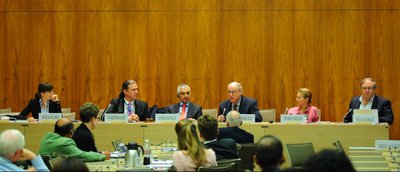15 Oct 2013
High-level WTI participation in WTO Public Forum
A Working Session explored the Internet economy.
The World Trade Organization (WTO) hosted its three-day Public Forum earlier this month with the focus on trade and innovation. WTI was represented by faculty members Thomas Cottier, Anirudh Shingal, Mira Burri and Arno Hold.
Senior research fellow and lecturer in law Mira Burri organised and moderated a Working Session on the first day on “The Internet Economy and the Future of International Trade Law”. The panel brought together representatives of the industry – eBay and the Computer and Communications Industry Association (CCIA), scholars (Gary N. Horlick, William J. Drake), as well as experts from the WTO Secretariat (Hamid Mamdouh).
The Working Session sought to advance discussion on aspects of WTO law that need to be developed to keep pace with and even foster the Internet economy as a source of growth and innovation. It also looked at the broader landscape of Internet governance and the role of international trade regulation, at a time when concerns transcend border tariffs and relate to issues of Internet filtering, privacy and data protection.
Participants said the debate was lively and interesting and exposed the need to connect the so far unlinked discourses in trade and Internet matters. The panel stressed the benefits of multilateralism and sketched a few essential points for the Bali agenda in order to strengthen the relevance of the WTO in the age of digital trade.
Bali negotiations
Coming just two months before the Ministerial Conference in Bali in December, Bali negotiations to iron out a trade facilitation deal were a focus of debate, with a full day dedicated to the topics currently under discussion at the WTO.
In this context, the WTI held a workshop on the subject of ‘Graduation in intellectual property protection: potential in GI and patents’. The panel included WTI managing director Thomas Cottier, Senior research fellow and lecturer in economics Anirudh Shingal, as well as Anthony Taubman of the WTO.
It explored the potential of special and differential treatment (S&D) and graduation in the field of Geographical Indications (GI) and patent protection under negotiation at Bali. The session examined the extent to which GI protection as well as indication of source of information in patenting could be linked to levels of development and competitiveness. It also considered how countries below the thresholds could be exempted from commitments. The work drew on recent research undertaken in the field of patent law and pharmaceuticals.
Shingal’s presentation looked at the use of economic indicators and threshold analysis to present countries that would not be exempt from commitments under the TRIPS agreement. Following on from that, Taubman drew attention to an increasing availability of economic data, and to the likelihood of this influencing and shaping future negotiations.
Cottier emphasised that graduation and regulation on the basis of thresholds offers the option to take such data into account in assessing obligations and levels of protection.
Participants raised a number of interesting issues. For instance, Jayashree Watal from the WTO emphasised the need to study more carefully the graduation angle of access to essential drugs, and also suggested that GIs are complex as they rely upon a product by product approach.
Innovation and investment in LDCs
Arno Hold, NCCR Research Fellow and Programme Director at the WTI/CUHK Summer Programme on Intellectual Property in Hong Kong, participated as a panellist in the WTO Public Forum Working Session 17 on ‘Promoting Innovation and Investments in Least-Developed Countries (LDCs): an Impossible Task?’, organised by IDEAS Centre in collaboration with the International Centre for Trade and Sustainable Development (ICTSD).
His presentation questioned how LDCs can benefit from the second extension of the transition period (2013-2021) for the implementation of the WTO TRIPS Agreement. The establishment in 2005 of a priority needs assessment process for LDCs on IP rights designed for tapping into technical assistance was promising, but proved quite inconclusive as only a handful of LDCs participated in the exercise. Moreover, the framework of such a process was not well defined, especially in terms of standards of assessment, scope, cooperation mechanisms etc. This stocktaking exercise ultimately underlined the systemic issues which brought LDCs to request a second extension of the transition period.
The second extension does not require LDCs to undertake any reform in the IP sector and does not provide any incentives to enhance conditions to foster transfer of technology and innovation, Arno Hold said. He therefore suggested that, for a better integration of LDCs into the international IP system, a more coherent and comprehensive priority needs assessment process leading to technical and financial assistance is needed. Furthermore, the implementation of TRIPS should take a more gradual and development-oriented turn so as to allow LDCs to reform their IP system according to the needs and capacities of their national economies. Finally, the different levels of technological capabilities amongst LDCs would additionally entail that only those IP rights that are relevant and adequate are considered.
Other speakers included Makiese Kinkela Augusto (Counsellor at the Permanent Mission of Angola in Geneva and focal point for TRIPS within the LDC Group), Taffere Tesfachew (Head of the LDC Division at UNCTAD), Pedro Roffe (Senior Associate in Innovation, Technology and Intellectual Property at ICTSD), and Padmashree Gehl-Sampath (Chief of the Science and Technology Section at UNCTAD).


